Archive for the ‘German Language’ Category
Online course German A2 from January 2nd, 2023
Tuesday, December 20th, 2022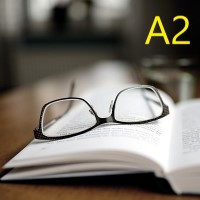 On January 2nd, 2023 an online course German A2 will start again. For those who have already completed their A1 course, there is now the opportunity to take the next level and expand their knowledge of German.
On January 2nd, 2023 an online course German A2 will start again. For those who have already completed their A1 course, there is now the opportunity to take the next level and expand their knowledge of German.
You shouldn’t wait too long after successfully completing an A1 German course and it’s better to continue straight away with an A2 course, because this improves your German skills and prevents you from forgetting a lot again during a longer break from learning for months. This is also the reason why German authorities usually do not recognize a certificate for longer than 12 months, for example for visa purposes.
Our online course A2 lasts about 8 weeks and takes place Monday to Friday from 9 a.m. to 12 p.m. GMT+8 and includes a total of 120 hours of instruction. The course fee is 24,000 Philippine Pesos.
A prerequisite is a completed German A1 course. Participation can be done from any country as long as there is a stable internet connection. Zoom and Google Classroom and Kahoot are used. Participation with a smartphone is possible, but a tablet or computer is recommended.
Registration until December 30th, 2022 here!
German Language Examinations in Cebu
Saturday, August 20th, 2016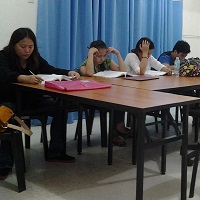 Good news! Starting October 2016 students in the Philippines can pass their German Examination A1, A2, B1 and B2 in Cebu City at the HDC German Knowledge Sprachzentrum.
Good news! Starting October 2016 students in the Philippines can pass their German Examination A1, A2, B1 and B2 in Cebu City at the HDC German Knowledge Sprachzentrum.
ÖSD stands for “Österreichisches Sprachdiplom Deutsch” (Austrian German Language Diploma), as well as “Österreich, Schweiz, Deutschland” (Austria, Switzerland, Germany). The using of the names of the three countries indicates the pluricentric nature of the exams, as well as recognizing the standard variations of the German language in the three different countries.
(more…)
German Language Exams
Friday, January 29th, 2016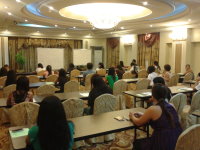 The next available examinations for German language (A1, A2, B1, B2) in the Philippines, provided by Goethe Institut:
The next available examinations for German language (A1, A2, B1, B2) in the Philippines, provided by Goethe Institut:
(more…)
German – Exams in the Philippines
Saturday, August 30th, 2014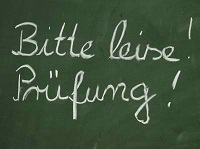 Below is a list of upcoming dates for the German language examinations by the Goethe Institute in the Philippines. The examinations corresponds to the different levels (A1 to B2) on the six-stage scale of competence levels of the Common European Framework of Reference for Languages. The Goethe-Zertifikat A1/ Start Deutsch 1 can be used by spouses as proof of the German language skills that are required for them to be reunified with their partners in Germany. The certificate is also required for issuing the visa for Marriage (Fiancé).
Below is a list of upcoming dates for the German language examinations by the Goethe Institute in the Philippines. The examinations corresponds to the different levels (A1 to B2) on the six-stage scale of competence levels of the Common European Framework of Reference for Languages. The Goethe-Zertifikat A1/ Start Deutsch 1 can be used by spouses as proof of the German language skills that are required for them to be reunified with their partners in Germany. The certificate is also required for issuing the visa for Marriage (Fiancé).
German A1 – Exams in the Philippines
Thursday, January 10th, 2013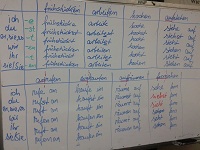 Below is a list of upcoming dates for the examination “Start Deutsch 1” (A1) by the Goethe Institute in the Philippines. The examination corresponds to the first level (A1) on the six-stage scale of competence levels of the Common European Framework of Reference for Languages. The Goethe-Zertifikat A1/ Start Deutsch 1 can be used by spouses as proof of the German language skills that are required for them to be reunified with their partners in Germany. The certificate is also required for issuing the visa for Marriage (Fiancé).
Below is a list of upcoming dates for the examination “Start Deutsch 1” (A1) by the Goethe Institute in the Philippines. The examination corresponds to the first level (A1) on the six-stage scale of competence levels of the Common European Framework of Reference for Languages. The Goethe-Zertifikat A1/ Start Deutsch 1 can be used by spouses as proof of the German language skills that are required for them to be reunified with their partners in Germany. The certificate is also required for issuing the visa for Marriage (Fiancé).
Goethe-Zertifikat A1: Next Examinations
Friday, September 21st, 2012 Below is a list of upcoming dates for the examination “Start Deutsch 1” (A1) by the Goethe Institute in the Philippines. The examination corresponds to the first level (A1) on the six-stage scale of competence levels of the Common European Framework of Reference for Languages. The Goethe-Zertifikat A1/ Start Deutsch 1 can be used by spouses as proof of the German language skills that are required for them to be reunified with their partners in Germany. The certificate is also required for issuing the visa for Marriage (Fiancé).
Below is a list of upcoming dates for the examination “Start Deutsch 1” (A1) by the Goethe Institute in the Philippines. The examination corresponds to the first level (A1) on the six-stage scale of competence levels of the Common European Framework of Reference for Languages. The Goethe-Zertifikat A1/ Start Deutsch 1 can be used by spouses as proof of the German language skills that are required for them to be reunified with their partners in Germany. The certificate is also required for issuing the visa for Marriage (Fiancé).
Nominative, Accusative, and Dative: When to Use Them
Thursday, September 1st, 2011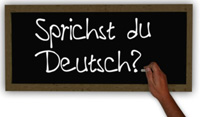 Modern High German distinguishes between four cases — nominative, accusative, dative, and genitive — and three grammatical genders — feminine, masculine, and neuter. In this article should given help for German language learners regarding to the grammatical cases Nominative, Accusative and Dative.
Modern High German distinguishes between four cases — nominative, accusative, dative, and genitive — and three grammatical genders — feminine, masculine, and neuter. In this article should given help for German language learners regarding to the grammatical cases Nominative, Accusative and Dative.
Start Deutsch 1 – the next examination dates in the Philippines
Saturday, August 27th, 2011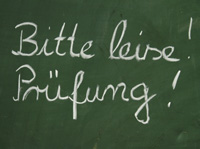 Below is a list of upcoming dates for the examination “Start Deutsch 1” (A1) by the Goethe Institute in the Philippines. The examination corresponds to the first level (A1) on the six-stage scale of competence levels of the Common European Framework of Reference for Languages. The Goethe-Zertifikat A1/ Start Deutsch 1 can be used by spouses as proof of the German language skills that are required for them to be reunified with their partners in Germany. The certificate is also required for issuing the visa for Marriage (Fiancé).
Below is a list of upcoming dates for the examination “Start Deutsch 1” (A1) by the Goethe Institute in the Philippines. The examination corresponds to the first level (A1) on the six-stage scale of competence levels of the Common European Framework of Reference for Languages. The Goethe-Zertifikat A1/ Start Deutsch 1 can be used by spouses as proof of the German language skills that are required for them to be reunified with their partners in Germany. The certificate is also required for issuing the visa for Marriage (Fiancé).
German Noun Gender
Thursday, June 16th, 2011
Most world languages have nouns that are either masculine or feminine. German, besides capitalizing all nouns, goes them one better and adds a third gender: neuter. The masculine definite article (“the”) is der, feminine is die, and neuter is das. German-speakers just seem to know whether Wagen (car) is der or die or das. (It’s der Wagen.) And they also know that the other German word for car is das Auto. But when referring to cars by brand name, it’s always der Ford, der VW or der Mercedes.
It’s not the actual person, place or thing that has gender in German, but the WORD that stands for the actual thing. That’s why a “car” can be either das Auto (neut.) or der Wagen (masc.).
Forget linking gender to a specific meaning or concept. Although nouns for people often follow natural gender, there are exceptions such as das Mädchen, girl. There are three different German words for “ocean” or “sea”—all a different gender: der Ozean, das Meer, die See! And gender does not transfer well from one language to another. The word for “sun” is masculine in Spanish (el sol) but feminine in German (die Sonne). A German moon is masculine (der Mond), while a Spanish moon is feminine (la luna). It’s enough to drive an English-speaker crazy!
Examination Deutsch 1 (A1) in Cebu
Thursday, May 26th, 2011 The next examination Start German 1 (A1) by the Goethe Institute in Cebu will be held on August 6 and 7, 2011. Registrations to participate in this exam in Cebu must be done until July 22, 2011.
The next examination Start German 1 (A1) by the Goethe Institute in Cebu will be held on August 6 and 7, 2011. Registrations to participate in this exam in Cebu must be done until July 22, 2011.
(more…)

